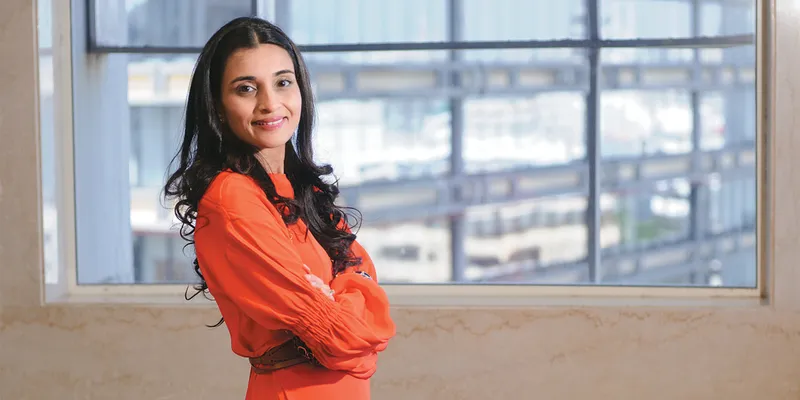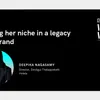Women should think of job as a career, not just a job, says Aditi Kothari Desai of DSP Investment Managers
In a conversation with HerStory, Aditi Kothari Desai, Vice Chairperson of DSP Investment Managers, speaks about her journey, learnings, and her advice to women interested in investment management.
Aditi Kothari Desai is the Vice Chairperson of DSP Investment Managers Pvt. Ltd. (DSPIM). She also heads Sales and Marketing, and serves as a member of the Executive Committee.
She leads financial wellness initiatives at DSPIM and was instrumental in launching Winvestor, a special initiative aimed at empowering women with confidence and financial knowledge to plan for their economic and long-term security.
With a bachelor’s degree in Economics from the Wharton School, University of Pennsylvania, and an MBA from Harvard Business School, Aditi started her professional journey in 1998 with Merrill Lynch’s investment banking group in New York, where she primarily worked on M&A activities in the Financial Institutions Group.
Subsequently, she worked in DSP Merrill Lynch as part of the fixed income sales team and later joined DSP Merrill Lynch Fund Managers in 2002 (now DSPIM), where she worked on various projects, including establishing an offshore fund for foreign investors.
Apart from being an Independent Director at Godrej Agrovet, she serves on the Board of DASRA, a leading strategic philanthropy foundation in India.
A wildlife enthusiast since the age of 10, Aditi is also a trustee at the Wildlife Conservation Trust (WCT), a non-profit-organisation that focuses on saving India’s forests and wildlife. She is also a trustee in the Hemendra Kothari Foundation and Shah PJ Kothari and Shah MVMVB School.
In an interaction with HerStory, Aditi speaks about her journey into the world of sales, her career, learnings, her role at DSP Investment Managers, and a word of advice for women interested in investment management.
Edited excerpts from the interview:

Aditi Kothari Desai
HerStory (HS): Tell us about your early years, and how you got interested in sales?
Aditi Kothari Desai (AKD): I was born and brought up in Mumbai. My father has always been in the financial services business and so was my family. I am the fifth generation.
I was always interested in business because I saw my father doing it, but I just didn’t understand what he did.
While in school, my friends would say that their father was an engineer, a doctor, or a lawyer, but I didn’t really know what my father did because he was a merchant banker. And people didn’t know what that was, and so, I was determined to understand that.
I was lucky to get into Wharton for my under-graduation, where I majored in finance. I also enjoyed management and was more interested in business.
And now, I am with a mutual fund, which is like a combination of B2B, B2C, business and finance. So, there was no better option to me than investment management.
HS: Tell us about your college life and how it shaped the decisions you made?
ADK: I did my undergrad in the US at Wharton, and the great thing about American education is that it allows you to take all kinds of courses in different fields.
For instance, at Wharton, you can take up to half the number of courses required outside the school. I also took Russian History and political history of Russia, the USA, and China. In a way, they are all relevant to everything happening today. I also took French in addition to all the usual classes.
As I majored in finance, I took my finance classes and valuation classes as well. I liked fixed income and took classes on fixed income, accounting, risk, and corporate law.
It was interesting and something I would encourage everyone to do if they can and they want to.
College gave me a lot of confidence. It gave me the confidence to be independent, and so, it had a huge influence on me. I also give my parents a lot of credit because they always encouraged me to be independent from the very beginning.
HS: Tell us the different positions you held and what were your learnings from each of these places?
ADK: My first job was as an intern at Merrill Lynch in New York at the age of 20. I was on the debt capital market side. I think I just really learnt about the commitment that is needed for something like this.
The first lesson I learnt was to just show up. Everyone was so busy and no one was going to sit and help me. So it just made me feel resourceful and independent.
Once, I had to make some charts and I asked how do I do it? It was 1996, and internet was very new then to search and figure out. They gave me a book on Excel and said figure it out. And that is exactly the kind of training we all need.
Don’t expect someone to help you in your job. Neither is it their responsibility to help you, nor should you feel entitled to get help. You must be responsible and resourceful and take initiative.
Later, I worked in equity capital markets, and then I did investment banking for two years. It was tough because sometimes I didn’t go home for two days. I think that is inhumane and I would never do that, and I wouldn’t expect that from my employees. I also realised that I could work hard and produce amazing work.
There was a lot of attention given to detail and there was no room for mistakes or to say no. You just had to do it. So, anything I did after that was a breeze.
I also learnt what I should expect from employees and what I should not. So those were some great lessons and a superb foundation.
Later, I was at DSP doing fixed income and we were still DSP Merrill Lynch. Here, I learnt a lot of basics about Indian fixed income market and how things work. Again, it was quite an ambiguous role. No one was going to define anything for me. So, I had to make it on my own. Frankly, I was thrown into the deep end and I had to learn how to swim.
HS: What was your experience and learnings from your previous organisations?
ADK: After DSP, I moved to the Asset Management Company in 2002. I always wanted to do something in B2C – just doing one transaction via an M&A deal or an IPO or the like never really excited me. It wasn’t as fulfilling as something more long term and something more connected to the end audience. And so I think the asset management space made sense to what I like - business, finance, and B2C.
In that connection, I started a couple of international funds. I think in the first year we had raised almost $1.5 billion and $1.7 billion between two funds. No one thought we’d ever raise so much money. One was listed in Luxembourg and the other was listed in Japan. I thought of the idea and actually enabled its structure and everything from scratch.
Then I went to business school, where I spent two years. I was in Boston at Harvard Business School. I came back and I tried to implement certain things that I had learnt. I tried to create competitions in sales. I created groups in sales because I thought younger people should also be given leadership opportunities. Even though I wasn’t in sales back then, these were all my suggestions which then happened. When the marketing head left in 2011, I got a role to head marketing, which I love.
In 2012 I realised that marketing and digital go hand-in-hand. So, we thought of digital marketing way before a lot of our peers. We realised that we needed an online sales area and hired people, and we had everything in-house, which is completely different from other people.
We didn’t want to outsource anything because I felt that we need to be in control of the actual source code because it minimises bugs in the long run. That was an instinct I had, and I think we were correct.
We are the only AMC that recruits developers at this scale and have them in house to produce because we realised how important a USP that is. So, I learnt a lot from all the different areas I’ve done.
I then became head of sales and marketing and e-business. Overall, I have grown up the ranks and learnt a lot. I have also learnt how important MIS and numbers are and the accuracy of it, paying attention to, taking your cues from and really working from it.
I also learnt a lot about different cultures. How you speak to people in the US and how you speak to people in India is completely different because they interpret it in different ways -- the words you use and the choice of words.
I realised that as a leader, you have to get to the middle ground. I learnt a lot from all this, and also being able to talk more to the international audience. So, all my experiences have really helped me, and I continue to learn more.
HS: Why did you join DSP Investment Managers and what compelled you to do so?
ADK: For me, firstly it was a family-run company, so me being the oldest child always felt the sense of responsibility. Another thing that compelled me was that I like the B2C business. I didn’t really feel like I could work for a very transactional based company or a transactional based industry. I preferred the B2C element, which is what the mutual fund or the asset management division had to offer. So I was happy to be there. I joined DSP Investment Managers in November 2020.
HS: What is your role at DSP Investment managers?
ADK: My core role at DSP Investment Managers is managing all sales functions. There are three important pillars in any asset management company. One is the investment function, the other is the back office - operations, financials, and the accounting of the net asset value, which is the price of every unit or every fund that we sell. We have to record that every day and do it precisely.
The third pillar is the actual business, selling these units, and selling mutual funds. I head the entire sales area, both offline and online, and all the marketing that goes with it. I am now going to be working much more on the strategy front.
HS: What are your plans ahead?
ADK: My vision is to make DSP the most trusted mutual fund house. Eventually, it will become much larger than what it is today because people trust us.
Our main focus should be the investors, their returns, and doing the right thing, selling the right product, at the right time, to the right person, for the right reason. If we can get that right, then everything else flows from it.
So my vision is to make DSP an even more trusted brand, and it is as digitalised as possible.
We do cut down a lot of mundane tasks and we make it easy for investors to access us through their distributors or directly. The focus would be on making it easy for both our partners and our end clients to be able to engage with DSP in as digital a manner as possible.
HS: What advice would you give young women interested in the field, and how do you think we can encourage more women in the segment?
ADK: I would tell them firstly that any job you take must be taken seriously. If you think of it as a job that is going to give you money till your marriage or you have kids, then you know you will never invest fully into it and then people who invest in you will be disappointed.
So, make it very clear from the beginning that this is going to be a career and not just a job.
A good thing is that we are having a lot of women interested in the field, but they are more interested in sales and marketing. We don’t see enough women invested in the investment management areas.
Maybe women prefer not to be on that side because of the biases they may have. But one needs to break the biases. And if you are a commerce student and a finance student, or if you are doing your CA, get deeper into understanding the valuation of companies and how the markets work.
Just get interested in the principles of investing. Because not only are you going to be helping thousands or lakhs of investors, but you are going to be helping yourself to manage your own money better.
Edited by Megha Reddy











